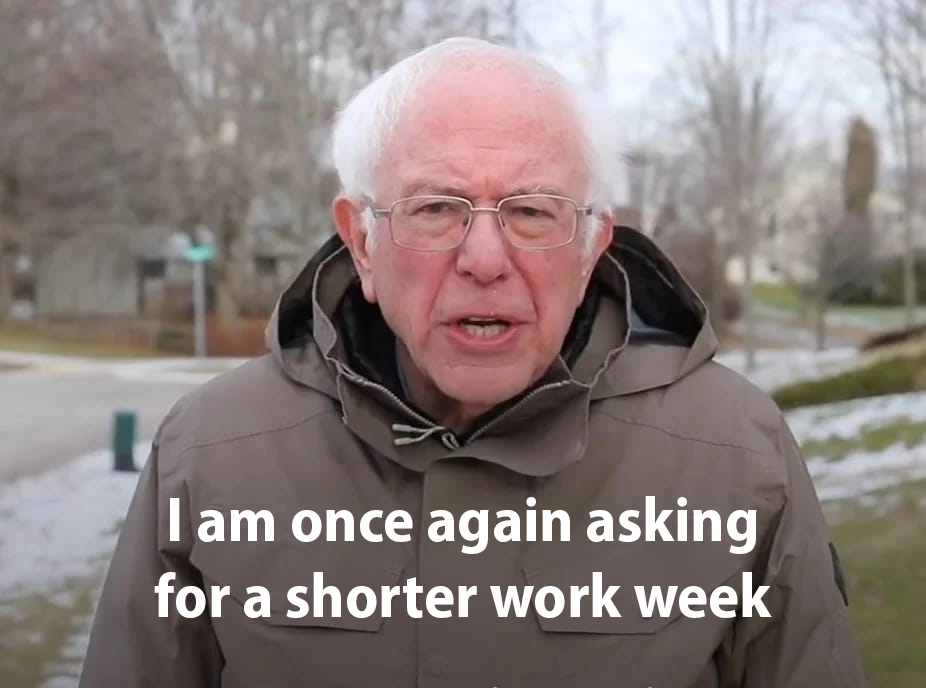
The struggle over the length of the working day is nearly as old as capitalism itself. During the Industrial Revolution, American workers clocked in for brutal 80-100 hour work weeks until socialists, communists, and anarchists began unionizing their workplaces, and organizing worker strikes around the eight hour work day. The police violently cracked down on the strikers, one example being the 1886 Haymarket Massecre, where a bomb blast set off a barrage of police gunfire. Eight anarchist labor activists were arrested without any evidence, and seven of them were hanged. Their efforts eventually culminated in the creation of the Fair Labor Standards Act in 1940.
However, as capitalists have chipped away at unions and New Deal reforms over the decades, we find ourselves inching back towards square one. 52% of adults employed full time in the U.S. report working more than 40 hours per week. The growing gap between productivity and compensation has been well-documented.

American workers are producing more than ever, but earning less than they did 50 years ago, after adjusting for inflation. Many of us are having to pick up multiple jobs just to make ends meet. Workers are even having their overtime pay denied (stolen), costing some households $35,451/year. On top of this, there’s a growing pay gap between the labor aristocracy and the essential workers providing the hard labor that keeps the economy afloat. What can we do?
In March of 2024, Sen. Bernie Sanders announced he will introduce legislation to change our workweek standard from 40 hrs to 32 hrs with no loss in pay. This would be a revolutionary change that would make sure workers benefit from our increased productivity in this country.
This bill would reduce the maximum hours threshold for overtime from 40 to 32 hours. Workers would be paid time and a half for work days longer than 8 hours and double for work days longer than 12. The bill would also ensure that workers’ pay would not be reduced along with the reduction of hours.
What we need is to build support in the Senate and the House by activating voters, and organizing the working class to build strong unions.
“I know when my members look back on their lives, they never say, ‘I wish I would have worked more.’ When people reach the end of their lives, they never say, ‘I wish I made more money.’ What they wish for is they wish they had more time.”
– Shawn Fain, President of UAW
32 HOURS A WEEK WORKS
It’s pretty obvious that working less hours in a week is nice for the workers, but it’s also better for the workplace in general.
A 32 hour work week pilot was done in the UK in 2022. It involved 61 organizations over a period of 6 months. These orgs reported overwhelmingly positive feedback to the pilot. They reported that staff well-being improved, staff turnover reduced, and recruitment rate went up. All of which helped to improve productivity in the workplace. The pilot worked out so well that 54 of those orgs (89%) continued the policy at least a year after the pilot and 31 of them (51%) made the four day work week permanent.
When you think about it, this all makes perfect sense. Right now we are so overworked that we struggle to find time for ourselves outside of work. Taking back an extra day in the week frees up enough time for us to relax, socialize, and it helps with mental and physical health which means when we do go back to work, we feel less miserable. Even though we currently work 40 hours a week, we rarely actually do 40 hours worth of work. Spending less time at the workplace will not actually reduce the amount of work we can get done, so there’s no reason to keep us there for so long.
From the cubicles to the factory floor, service workers, sex workers, and everyone in between. Workers should fight to make this change and take back their time!
